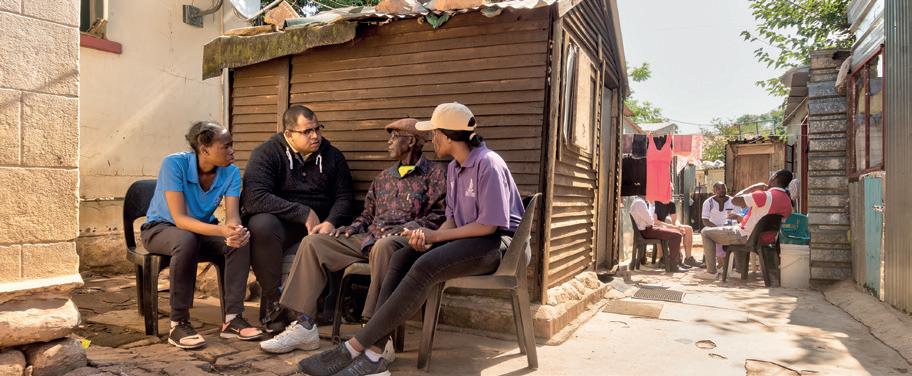
12 minute read
Engagement
As an anchor institution, UP is rooted in its communities and plays a central role in their social, cultural and economic wellbeing. As a research-intensive partner, UP is locally responsive, but continental in scope and globally engaged to make a significant contribution to transforming the world.
38
39
42 Making a difference locally: community engagement Making a difference nationally: high-profile events Making a difference globally: strategic partnerships
A university is shaped as much by what happens on campus
as what happens off site and the University of Pretoria (UP) works tirelessly to ensure that it remains relevant by working for society, with society. Our students are encouraged to use their knowledge in a practical way through community engagement in the communities neighbouring our campuses.
MAKING A DIFFERENCE LOCALLY: COMMUNITY ENGAGEMENT
It is critical that UP uses the knowledge of its students and staff to make a positive and meaningful difference to the lives of the people in its communities. That UP does so effectively is evidenced by its membership of the University Social Responsibility Network, a network of 16 top universities in the world selected for their responsiveness to their local context.
UP as an anchor institution
In 2019, the University, in close collaboration with the Hatfield City Improvement District (CID), continued on a path first embarked upon in 2004, to counteract creeping urban decay in the suburb in which the largest of its campuses is situated. The University collected some 50 000 bags of waste throughout the year, repaired damaged pavements and potholes, and removed unsightly graffiti and illegal posters.
Further efforts to create an attractive environment, especially in the public areas surrounding the Hatfield Campus, resulted in laying down new paving, building flower boxes and providing street seating.
Safety and security in the public spaces through which students and staff have to move to reach the campus and where they spend much of their time also received attention. By deploying private security guards, installing CCTV cameras and a control room, and donating two patrol vehicles to the first satellite Metro Police station in Tshwane, UP has improved the security substantially.
For longer-term impact, UP has developed an urban design framework and a precinct plan for the area surrounding its Hatfield and Hillcrest campuses. Once approved by the Tshwane City Council, this will become City policy to guide future socio-economic and physical development of targeted areas.
Building social capital
UP has run a successful community engagement programme for more than 15 years. Through its nine faculties and student volunteer organisations, the University uses its extensive skills and knowledge base to empower communities with development ventures.
Tshwane Executive Mayor Stevens Mokgalapa and MMC Karen Meyer celebrate the opening of the Hatfield satellite police station with a 79-CCTV camera monitoring system. With them are CID Hatfield CEO Lucas Luckhoff and Prof Tawana Kupe.
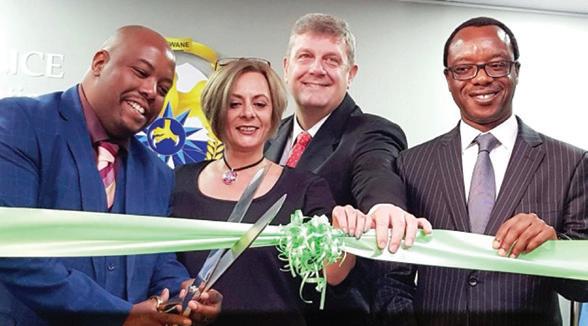
A major part of this community engagement is curricular (involving 300 modules), where students earn credits towards their degrees while applying their knowledge in the service of the community. Each academic programme includes at least one community engagement component. Besides providing an in-depth learning experience for students, these opportunities help develop their skills in managing relationships, solving problems and civic responsibility, which offers our students a competitive edge when entering the world of work.

The launch of Future Africa was a highlight on UP’s calendar.
More than 29 000 undergraduate students are involved in curricular community engagement projects at over 1 000 sites. The Viva Village in Mamelodi’s Alaska Township is a multi- and transdisciplinary community engagement hub in which all faculties are involved. They work together with residents, healthcare workers and clinics to provide a holistic health service. The same is done in Zama-Zama and Plastic View informal settlements, and at the Pop-Up Clinic at Salvokop. In addition, veterinary science students are involved in rural vaccination stations while occupational therapy students work with parents and toddlers on the importance of play in children’s development.
Volunteers from approximately 120 registered student societies also contributed to the various community projects. Other groups who volunteered came from the residences, faculty houses and the SRC. Some 1 000 students were placed in programmes as part of their bursary conditions.
MAKING A DIFFERENCE NATIONALLY: HIGHPROFILE EVENTS To say that 2019 was an eventful year for UP is an understatement. Two events, though, stand out in marking UP’s status as a leader in the field of transdisciplinary research, while others reinforce the depth of its historical roots and modern-day connections.
Launch of the Future Africa Institute and Campus
The launch of Future Africa as a flagship pan-African research institute, on 29 March, was the culmination
A veterinary student vaccinates a pet at the Mamelodi Animal Health Clinic.
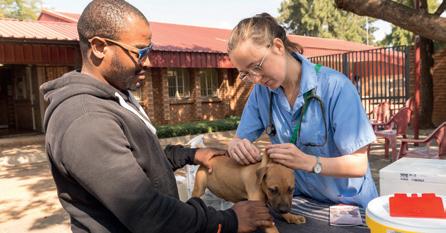
of several years of conceptualisation, planning, design, building construction and knowledge production which started as far back as 2012, when the first set of proposals was presented to the University Executive.
In the run up to the launch day, seminars, workshops and ‘think tank’ sessions were held, which resulted in the identity of Future Africa becoming evident: It is a community, a research hub, a home for scholars from across Africa and the rest of the world, and a meeting place. It provides the physical and intellectual environment for transformation-minded transdisciplinary leaders and innovative business leaders, policymakers, civil servants and civil society to interact and take knowledge forward across disciplines, cultures and generations.
The aim of Future Africa is to promote research that is relevant to Africa. It is well-positioned as a hub for African research networks in collaboration with local and global partners to address the significant challenges that Africa faces as a continent. It deliberately focuses on involving and developing the next generation of scholars who will lead Future Africa’s initiatives and programmes to create a more sustainable version of our world.
Javett-UP is an inspirational space where exhibitions, events and performances will enrich society.
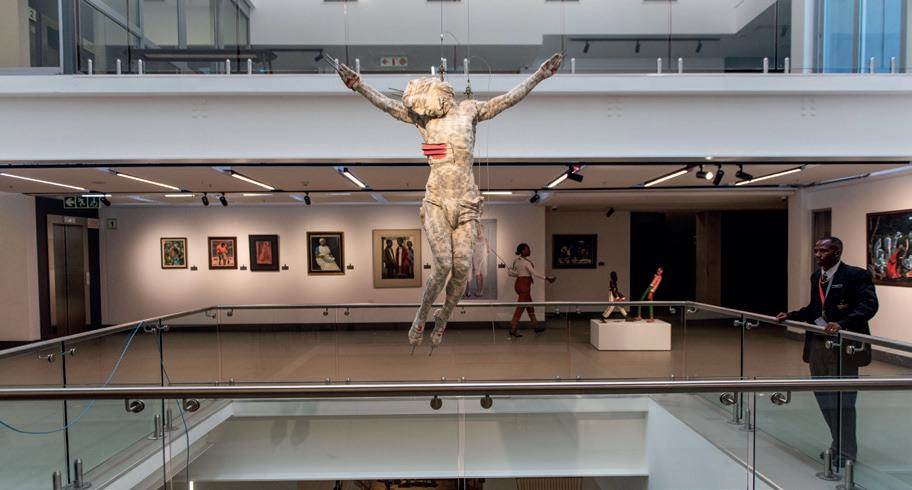
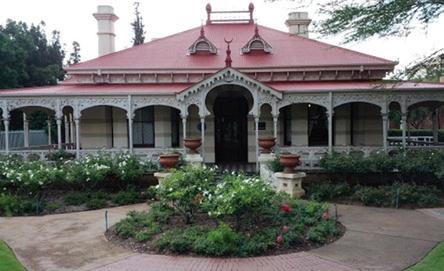
Programmes already well-established are the Africa Science Leadership Programme and the Tuks Young Research Leader Programme. In 2019, the Early Career Research Leader Fellowship Programme was launched, with funding support from the Carnegie Foundation in partnership with the NRF.
The Faculty of Humanities celebrated its centenary in 2019.
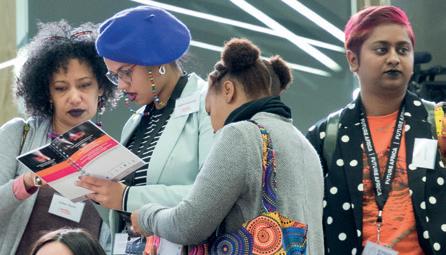
The launch day was marked by workshops in the morning with the official proceedings taking place during the afternoon and addresses by, among others, the former Minister of Science and Technology, Ms Mmamoloko Kubayi-Ngubane.
Launch of the Javett-UP Art Centre
Heritage Day, 24 September, marked the official launch of the new Javett Art Centre at the University of Pretoria (Javett-UP), which is set to become a popular landmark in the City of Tshwane. The development of the Centre was done in partnership with the Javett Foundation, and it aims to engage students and the public with the creativity and diversity of local and international art and artists.
The launch was an opportunity to experience some of the greatest art of Africa under one roof and close on 1 700 people visited the Centre on the official opening day. The admission fee for the first week was waived, and the public had an opportunity to view this magnificent attraction absolutely free. This is in line with the University’s position of being a public institution that takes seriously its engagement with, and contribution to, the broader society.
Earlier in the year, Minister of Tourism, Derek Hanekom,
paid a visit to the Javett-UP and endorsed the significance of the Centre for art, heritage and cultural tourism in South Africa.
Faculty of Humanities @100
The centenary celebrations of the Faculty of Humanities were launched with the Dean’s Concert. In addition to the UP Symphony Orchestra conducted by Gerben Grooten, various performers added to the lustre. These included pianist, Steinway Artist and senior music lecturer Dr Ben Schoeman, classical voice programme leader in the School of Arts Dr Hanli Stapela, student and mezzosoprano Monica Mhangwana, singer and vocal coach Mxolisi Duda and production manager and theatre performer Phuti Matuba.
Universities in dialogue
The Motsepe Foundation and UP partnered in an event to acknowledge and commemorate some of the gains made to achieve gender equity in South Africa. They also explored what has not been achieved and why there appear to be structural and political bottlenecks. The purpose of this initiative was to elevate the voices of young people, to drive policy and share solutions to the problems facing their generation. The University of Cape Town (UCT), University of the Witwatersrand (Wits) and the University of the Free State (UFS) also participated.
World Bank economic update
UP hosted the World Bank’s release of its South Africa economic update, entitled Tertiary education enrolments must rise. The event, held at Future Africa, was attended by Minister Naledi Pandor. The World Bank report asserts that government’s decision to subsidise free education

Prof Mary Metcalfe, Education Expert; Prof Chika Sehoole, UP Dean of Education; Ari Katz, CEO of Boston City Campus; and David Kabwa, President of the UP Student Representative Council. The Universities in dialogue will become an annual event driven and led by the Motsepe Foundation and UP.
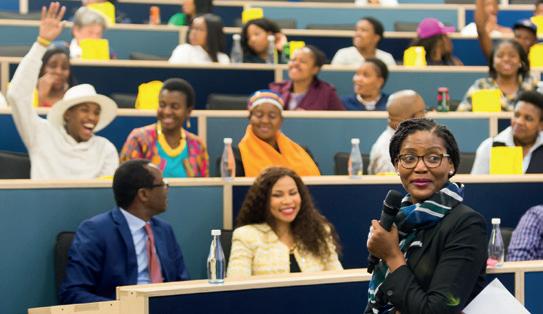
to poor students will put a strain on the fiscus, and will ultimately be unsustainable.
South African Malaria Conference
The Institute for Sustainable Malaria Control (UP ISMC) co-hosted the 5th Southern African Malaria Research Conference with the South African Medical Research Council (MRC) at Future Africa. The gala dinner was attended by UP Vice-Chancellor and Principal, Prof Tawana Kupe, the Minister of Health, Dr Zweli Mkhize and the President of the South African Medical Research Council, Prof Glenda Gray. The Minister launched the Malaria National Strategic Plan during this dinner.
Other important events included: • The 4th South African Japanese Universities (SAJU) conference with the theme: The human being in the 21st
Century in the context of global changes. • The annual Inyathelo Leadership Retreat marked the 10th leadership event hosted by Inyathelo in partnership with the Kresge Foundation. The Kresge
Foundation has contributed US$22.4m to strengthen capacity development in South African higher education over the past decade. • At The Conversation, a meeting of The Global Editors of The Conversation and Conversation Africa, UP’s
Vice-Chancellor spoke on the role of science in the era of fake news and fallacies. This was followed by a panel discussion with panellists including a highly respected group of journalists and academics. What makes The
Conversation exceptional is that news and views are sourced from the academic and research community, and taken directly into the public domain.
The number of collaborators and potential collaborators on University projects has increased exponentially, and international institutions are vying for the opportunity to partner with UP in new and exciting projects.
UP attended the launch of a major cross-continental research institute, The Montpellier Advanced Knowledge Institute on Transitions (MAK’IT) focused on food, agriculture, health, the environment and sustainability, at the University of Montpellier in France. UP is the only South African university chosen to join some of the leading research universities with strengths in these areas. The mission of MAK’IT is to “analyse, accompany and accelerate agri-food, environmental and health transitions necessary to achieve the Sustainable Development Goals (SDGs)”. UP stands to benefit from the partnerships and collaborations which include joint research and staff and student exchanges.
UP also became the first South African partner of the Michigan State University-led alliance for African partnership (MSU-AAP). The University of Pretoria was confirmed as the 10th member of the alliance when the two institutions signed a Memorandum of Understanding. This alliance focuses on global challenges as expressed in six themes: agri-foods systems, culture, health and nutrition, water, energy and the environment, youth empowerment and collaboration.
The following Memoranda of Agreement were signed between UP and local and international partners, which will contribute to improving its international visibility and the quality of its research: • The University of Modena and Reggio Emilia – to collaborate on learning and research support in the car manufacturing and transport industries in South
Africa. Other Gauteng partners are Wits and Tshwane
University of Technology (TUT). This agreement also addresses three of the United Nations Sustainable
Development Goals • The Food, Agriculture and Natural Resources Policy
Analysis Network (FANRPAN) – to investigate where FANRPAN and UP could work symbiotically for greater impact in the food, agriculture and natural resource sectors across the African continent The Council for the Built Environment – to provide a framework to enhance the built environment in South Africa through a strategic partnership with UP.
In 2019, the University’s community engagement initiatives were further strengthened by its involvement with European Research Universities+ (ERASMUS+), UNIversity COmmunity LeaRNing (UNICORN), the Talloires Network, the University Social Responsibility Network (USRN) – representing universities involved in large-scale community engagement, and the South African Higher Education Community Engagement Forum (SAHECEF).
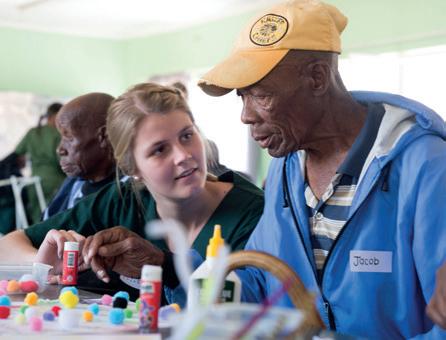
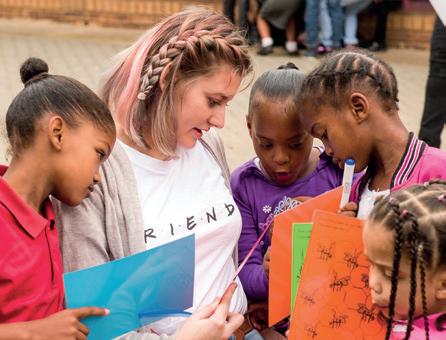
UP students actively volunteer their time to make the world a better place through the University’s official student societies.
Community engagement
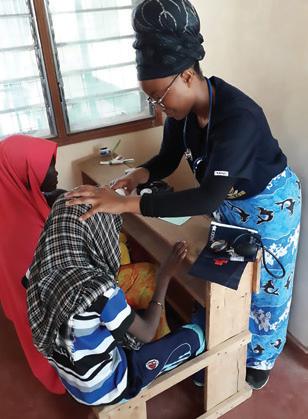
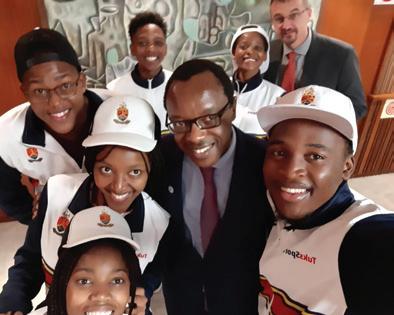
#AfricanMedicalOutreach Seven students used their mid-year break to travel 10 000km in 21 days and covered seven countries on their way to Kenya to assist with basic medical care in remote parts of Africa and to broaden their horizons to the beautiful African continent. Monetary and other donations were received and the University hosted a function to thank donors upon the students’ return.
33 000 Number of students involved in community outreach programmes

Firsts • Only SA university chosen to join The
Montpellier Advanced Knowledge Institute on
State University-led alliance for African partnership • Only SA university member of the global
University Social Responsibility Network
